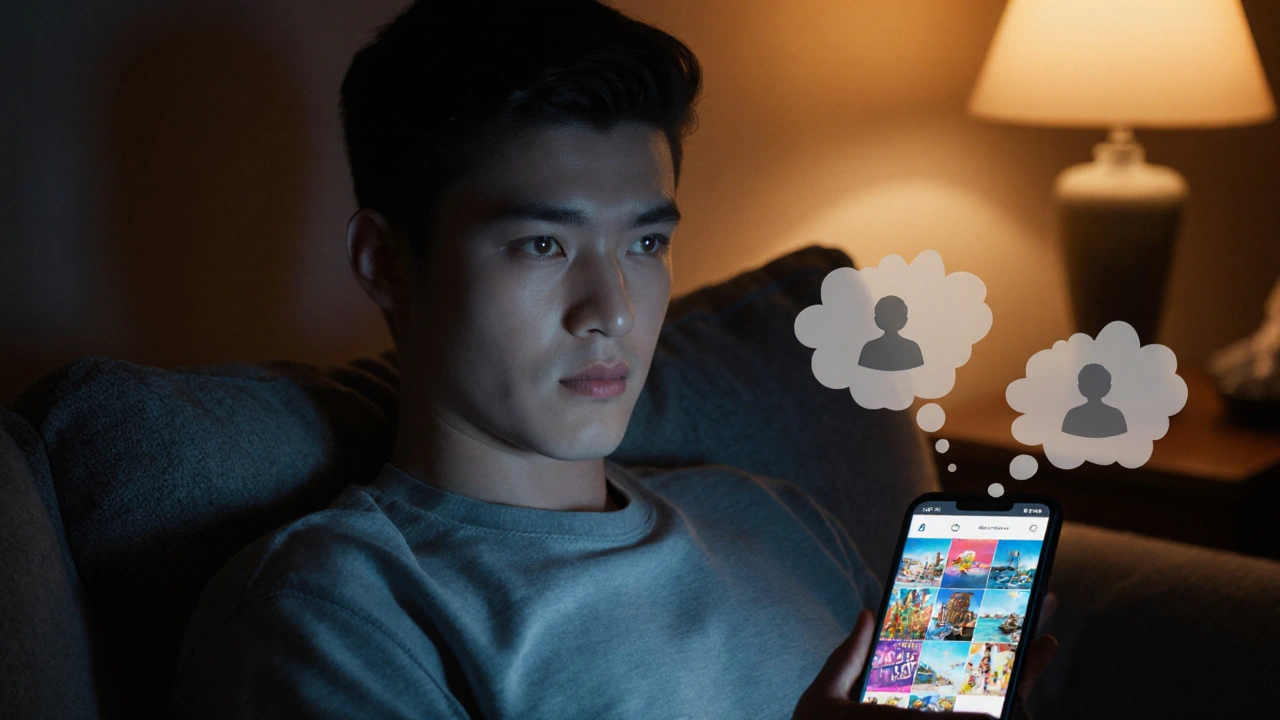Social Media Comparison Impact Quiz
Upward Comparison
Seeing others who appear more successful, attractive, or happy than you.
Can lead to anxiety, envy, and lowered self-esteem.
Downward Comparison
Seeing others who appear less fortunate or successful than you.
Provides temporary relief but can cause complacency.
Your assessment will appear here after answering the questions.
When you scroll through Instagram or TikTok, it’s easy to feel a pang of discomfort as you compare your life to the highlight reels you see. That uncomfortable feeling isn’t just a fleeting emotion - it’s a psychological response to what researchers call social media comparison, a form of social comparison that happens on digital platforms, often leading to lowered well‑being. This article breaks down why that happens, what kinds of comparison matter most, and practical steps you can take to protect your mental health.
Quick Take
- Upward comparison (seeing others look better) spikes anxiety and lowers self‑esteem.
- Downward comparison (seeing others look worse) offers short‑term relief but can create complacency.
- Social Comparison Theory explains the brain’s instinct to rank itself against peers.
- Frequent scrolling triggers dopamine spikes, reinforcing habit loops.
- Digital‑detox habits-timer limits, curated feeds, offline hobbies-reduce comparison stress.
Why Comparison Happens on Social Media
Social platforms are built on algorithms that surface the most engaging content, which often means the most polished, glamorous, or sensational posts. This creates a skewed sample of reality, known as the highlight reel effect. Your brain, wired for social comparison, instinctively measures its own status, achievements, and appearance against what it sees online.
According to Social Comparison Theory, we evaluate ourselves along two dimensions: ability and opinion. When we see others’ successes-or even curated versions of success-we experience “upward comparison.” The opposite, “downward comparison,” occurs when we notice people who appear worse off.
Upward vs. Downward Comparison: What the Research Says
| Comparison Type | Typical Emotional Response | Long‑Term Effect on Well‑Being |
|---|---|---|
| Upward | Envy, anxiety, self‑criticism | Increased depressive symptoms, lower self‑esteem, higher stress hormones |
| Downward | Relief, temporary boost in confidence | Short‑term mood lift, but can foster complacency and reduced motivation |
Studies from 2023‑2024 that tracked 2,000 daily users found that those who engaged in upward comparison more than three times per day were 27% more likely to report moderate‑to‑severe anxiety. Downward comparison, while providing a fleeting lift, rarely translates into lasting happiness.
The Brain’s Reward Loop: Dopamine and Habit Formation
Every time you get a “like” or see a flawless photo, your brain releases a surge of dopamine- the same chemical that reinforces eating or gambling. This reward loop makes scrolling addictive. Over time, the brain starts craving the dopamine hit, leading to longer sessions and more exposure to comparison triggers.
Researchers at the University of Cambridge measured dopamine spikes using functional MRI while participants viewed curated feeds. The spikes were 30% higher than when participants looked at neutral images, confirming that social media platforms are engineered to hijack reward pathways.

Real‑World Consequences on Mental Health
Beyond the immediate feelings of discomfort, chronic social media comparison correlates with several mental‑health outcomes:
- Depression: Longitudinal studies link high comparison frequency with a 1.8‑fold increase in depressive episodes.
- Sleep disruption: Night‑time scrolling elevates cortisol, making it harder to fall asleep.
- Body image issues: Exposure to edited photos fuels negative self‑perception, especially among teens.
- Reduced productivity: Frequent breaks to check feeds fragment attention, lowering work output.
These effects are not limited to heavy users. Even casual scrolling for 15 minutes a day can trigger the same patterns if the feed is dominated by upward comparison content.
Practical Strategies to Break the Cycle
- Set a timer: Use built‑in screen‑time tools to cap scrolling at 30minutes per session.
- Curate your feed: Unfollow accounts that provoke envy and follow creators who share authentic, behind‑the‑scenes moments.
- Practice “content fasting”: Designate one day a week with no social‑media use. Replace it with a hobby that gives you tangible progress.
- Activate upward comparison wisely: Follow role models for inspiration, not competition. Keep a journal noting specific actions you want to emulate.
- Mindful scrolling: Before opening an app, ask yourself what you hope to achieve. If the answer is “nothing,” close it.
Implementing just two of these habits can cut self‑reported comparison discomfort by up to 45% within a month, according to a 2025 pilot study at the University of Bristol.
When to Seek Professional Help
If comparison triggers persistent sadness, panic attacks, or interferes with daily responsibilities, it’s time to talk to a mental‑health professional. Cognitive‑behavioural therapy (CBT) often includes modules on “thought restructuring” that help reframe comparison thoughts into more balanced perspectives.
Therapists may also recommend a digital‑wellness plan, which integrates scheduled offline periods, tech‑free zones at home, and regular check‑ins on mood.
Looking Ahead: Platform Responsibility
While individual habits matter, platforms themselves are under pressure to curb harmful comparison mechanics. Recent EU regulations propose mandatory “well‑being prompts” after 60 minutes of continuous scrolling. Some apps have already rolled out “mindful mode” features that dim likes and hide follower counts.
These changes could shift the balance from endless upward comparison toward more authentic community building. Until they become the norm, the onus remains on users to shape their own digital environments.
Frequently Asked Questions
Why do I feel worse after looking at other people’s posts?
Most social platforms showcase curated, highlight‑reel content. Your brain interprets that as upward comparison, which triggers envy and self‑criticism, lowering mood.
Is occasional scrolling harmful?
Even short sessions can affect mood if the feed is dominated by aspirational posts. The key is awareness and limiting exposure.
What’s the difference between upward and downward comparison?
Upward comparison involves measuring yourself against those who seem better off, often leading to anxiety. Downward comparison means comparing yourself to those who seem worse off, giving a temporary confidence boost but rarely improving long‑term well‑being.
How can I stop the dopamine loop?
Set app timers, turn off push notifications, and replace scrolling with activities that provide intrinsic rewards, like exercise or creative projects.
When should I consider therapy for social media stress?
If comparison triggers persistent sadness, panic attacks, or interferes with work, relationships, or sleep, professional help can provide coping strategies and mental‑health support.
